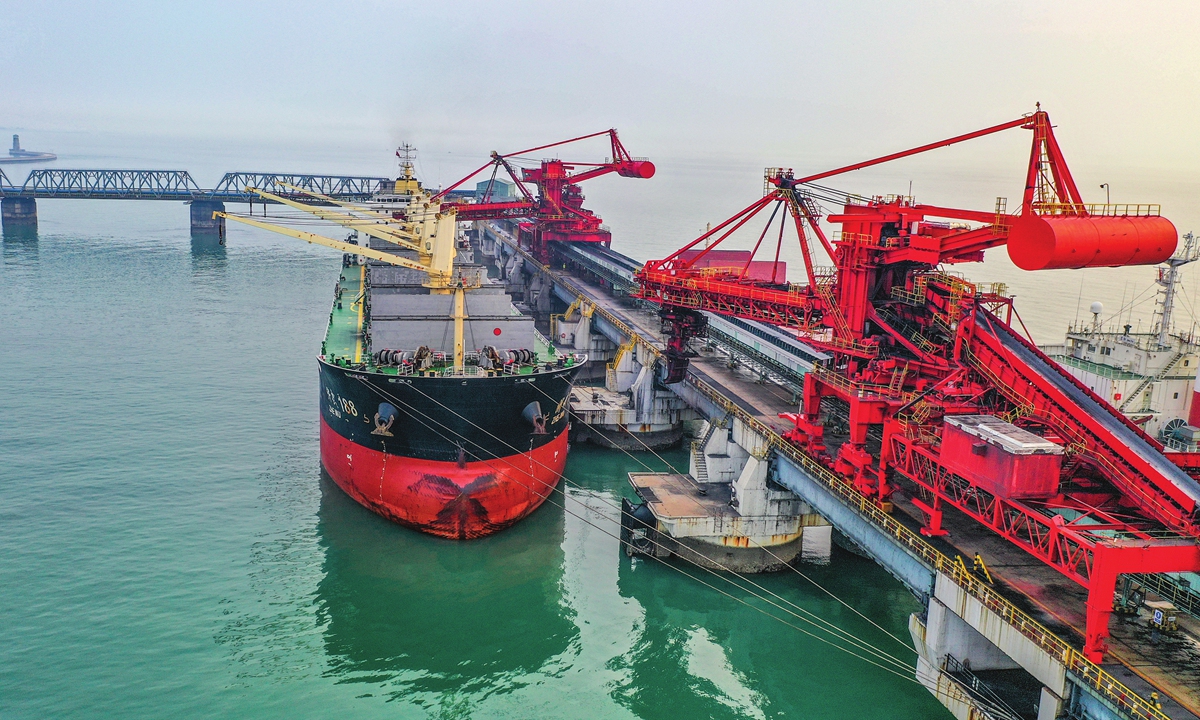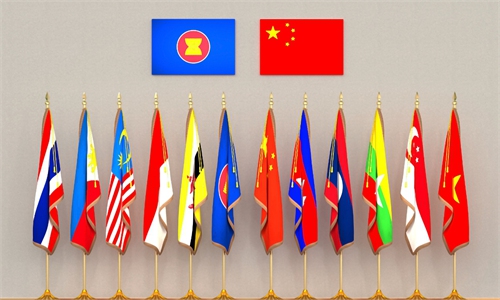
A coal terminal in Rizhao Port, East China's Shandong Province carries out orderly loading operations on March 16, 2024. This is an important trading port for Southeast Asian countries. Photo: VCG
In his State of the Union Address delivered on March 7, US President Joe Biden touted that "I've revitalized our partnerships and alliances in the Pacific," as he appears to be taking a victory lap for his China policy.Indeed, "revitalizing partnerships and alliances" has become a key feature in the current US administration's policy toward China, compared to what US media call the "go-it-alone approach" adopted by former US president Donald Trump.
However, while this might be music to the ears of many China hawks in Washington, the approach has grave repercussions for US' so-called allies, the Asia-Pacific region and the global economy as a whole.
Underneath this approach is Washington's relentless campaign to lure countries in the Asia Pacific and even those in Europe by using both carrots and sticks to join its attempt to contain China's rise, analysts said.
Contrary to what US officials have claimed, Washington's efforts to pit regional countries against each other and create an economic bloc against China have not succeeded, as the US, mired in geopolitical conflicts overseas and political chaos at home, failed to come up with any concrete plan, analysts noted. Above all, the US' geopolitically motivated approach runs against economic laws and fundamental interests of US allies, they noted.
'Desperate' efforts
Highlighting limitations of the US strategy is what some Chinese experts call "desperate" efforts by US officials to step up pressure on some of its allies in further tightening trade and technology restrictions against China.
On the same day as Biden gave his speech, US media outlets reported that the US government was urging the Netherlands, Germany, South Korea and Japan to further tighten curbs on China's access to semiconductor technology. The move comes as years of US cracking down on China's chip industry, including with cooperation from allies like Japan and the Netherlands, had failed to hold China back in the critical technology.
Then on March 11, the Biden administration unveiled its budget request for the 2025 fiscal year, which includes $4 billion over five years in mandatory funding for the US to "outcompete China," Reuters quoted a US State Department official as saying. The State Department also requested a separate $4 billion in discretionary funding to cover foreign assistance and diplomatic engagement in the region, according to Reuters.
The fund will allow the US administration "to continue to invest in the foundations of our strength at home, align with like-minded partners to strengthen our shared interests and address the challenges posed by PRC, and harness those assets to compete with PRC and defend our interests," said US Deputy Secretary of State for Management and Resources Rich Verma.
US Commerce Secretary Gina Raimondo also highlighted this approach during a trip to Southeast Asia last week. While visiting the Philippines, Raimondo announced that US businesses would invest more than $1 billion in the country. She also noted that the investment in the Philippines extends to the larger "Indo-Pacific region" through the Indo-Pacific Economic Framework (IPEF).
Launched by the Biden administration in 2022, the IPEF has been widely seen as one of Washington's efforts to lure regional countries into its containment of China. On Thursday, after an online ministerial meeting of the IPEF countries, Raimondo said that the initiative has made "significant strides." However, after two years, the initiative has failed to reach any concrete deals and faced some setbacks. A trade deal has been blocked by US lawmakers.
Seeking to contain China, "the US, on the one hand, is trying to draw together its so-called allies, while on the other hand, [it is] trying to hijack some weaker economies by wielding its market influence," Li Yong, a senior research fellow from the China Association of International Trade, told the Global Times on Monday. "However, many countries have not stopped developing ties with China, which shows the limitations of the US' approach."
Data also showed that ASEAN remains China's largest trading partner, with two-way trade rising steadily. In the first two months of 2024, China's trade with ASEAN grew by 8.1 percent year-on-year to 993.24 billion yuan ($139.88 billion), according to Chinese customs data.
Firm rebuttal
More importantly, the US campaign to pressure regional countries to join in its attempt to contain China has also drawn firm opposition from some regional leaders.
During the three-day ASEAN-Australia summit held in Melbourne, Australia in early March, Malaysian Prime Minister Anwar Ibrahim said that China is leading investor into Malaysia and Malaysians "do not have a problem with China," according to the US-based Associated Press.
Ibrahim went on to say that "so while we remain… an important friend to the United States and Europe and here in Australia, they should not preclude us from being friendly to one of our important neighbors, precisely China." He also said that "if they have problems with China, they should not impose it upon us. We do not have a problem with China."
Chinese experts said that more and more countries are increasingly worried about being caught up in the US' major-power contest with China, which runs against their interests.
"The US is trying to gather allies to lead its charge [against China]. And many allies will actually be used as cannon fodder," Hu Qimu, a deputy secretary-general of the digital-real economies integration Forum 50, told the Global Times on Monday.
Hu said that the US attempt to exclude China from global supply chains is simply unattainable given China's critical role and vast market. "So in the short term, the US might be able to launch some so-called initiatives, but I don't think they will last long. At a certain point when they try to implement them, it will fall apart immediately."
The fundamental problem with the US' campaign to pit countries against China and create economic blocs excluding China is that it runs against basic economic laws and ignores the intricacy of global supply chains formed through years of globalization, which has been beneficial for countries, analysts noted.
"The US simply cannot use the political surgical knife to cut such highly intertwined, win-win links. So the creation of small blocs is more of imagination of some politicians," Li said, noting that the US containment approach cannot contain China, but will instead hurt regional countries, the global economy and even the US itself.

